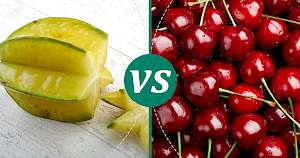Cherry vs Carambola: Nutrition, Calories & Protein Compared


Cherries vs Carambola
Nutrition Facts
Serving size:
change
5g10g15g20g30g40g50g60g80g100g120g140g160g180g200g220g250g300g350g400g450g500g600g700g800g900g1000g
1oz2oz3oz4oz5oz6oz7oz8oz10oz12oz15oz20oz25oz30oz35oz40oz50oz
Amount Per Serving:
Serving size:
change
5g10g15g20g30g40g50g60g80g100g120g140g160g180g200g220g250g300g350g400g450g500g600g700g800g900g1000g
1oz2oz3oz4oz5oz6oz7oz8oz10oz12oz15oz20oz25oz30oz35oz40oz50oz
Amount Per Serving:
Cherries vs Carambola 100g Compare
| per 100g | Cherry | Carambola |
|---|---|---|
| Calories | 63 | 31 |
| Carbohydrates | 16.1 g | 6.73 g |
| Fat | 0.2 g | 0.33 g |
| Dietary fiber | 2.1 g | 2.8 g |
| Protein | 1.06 g | 1.04 g |
| Calcium | 13 mg | 3 mg |
| Iron | 0.36 mg | 0.08 mg |
| Magnessium | 11 mg | 10 mg |
| Phosphorus | 21 mg | 12 mg |
| Potassium | 222 mg | 133 mg |
| Zink | 0.07 mg | 0.12 mg |
| Vitaminium A | 640 µg | 61 µg |
| Vitaminium B1 (Thiamine) | 0.027 mg | 0.014 mg |
| Vitaminium B2 (riboflavin) | 0.033 mg | 0.016 mg |
| Vitaminium B3 (Niacin) | 0.154 mg | 0.367 mg |
| Vitaminium B6 | 0.049 mg | 0.017 mg |
| Vitaminium B9 (Folic acid) | 4 mg | 12 mg |
| Vitaminium C | 21 mg | 34.4 mg |
Discover the Nutritional Delights of Cherry and Carambola
When it comes to tantalizing our taste buds with sweet and sour flavors, cherries and carambolas (also known as star fruits) stand out in the fruit world. Not only do these fruits offer unique tastes and textures, but they also come packed with a variety of nutritional benefits that cater to health-conscious individuals. Before diving into the nutritional comparison between these two, let's explore some interesting facts about each fruit that might catch your attention.
The Sweet Charm of Cherries
Cherries are beloved worldwide for their juicy, sweet flavor and vibrant red hue. They are not only a favorite snack during the summer but also a versatile ingredient in desserts, salads, and even savory dishes. Beyond their delightful taste, cherries are known for their health benefits, including high levels of antioxidants and anti-inflammatory compounds. These attributes make cherries a great choice for those looking to support their overall health and well-being.
The Exotic Appeal of Carambola
Carambola, or star fruit, is instantly recognizable by its unique star shape when cut across the middle. This tropical fruit offers a crisp texture and a refreshing mix of sweet and sour flavors. Carambolas are not just about their distinctive appearance; they are also rich in vitamin C, fiber, and other beneficial antioxidants. These nutrients contribute to a range of health benefits, from boosting the immune system to improving digestion.
Nutritional Comparison: A Closer Look
When comparing the nutritional profiles of cherries and carambolas, it's clear that both fruits offer valuable health benefits, albeit in different areas. Here's a breakdown of their nutritional content per 100 grams:
- Calories: Cherries contain 63 calories, while carambolas have only 31, making carambolas a lower-calorie option for those managing their energy intake.
- Carbohydrates and Fiber: Cherries offer 16.1 grams of carbohydrates and 2.1 grams of fiber, whereas carambolas provide 6.73 grams of carbs and a slightly higher fiber content at 2.8 grams.
- Fat and Protein: Both fruits have minimal fat, with cherries at 0.2 grams and carambolas slightly higher at 0.33 grams. Their protein content is nearly identical, around 1 gram per 100 grams of fruit.
- Vitamins and Minerals: Cherries are rich in vitamin A and provide a good amount of potassium and iron. On the other hand, carambolas shine with their higher vitamin C content and offer a decent amount of vitamins B3 and B9.
It's worth noting that both fruits are free of cholesterol and gluten, making them suitable for a variety of dietary preferences and needs.
Which One to Choose?
Choosing between cherries and carambolas ultimately depends on your personal taste preferences and nutritional needs. If you're looking for a fruit that's lower in calories and higher in vitamin C, carambola might be the right choice for you. However, if you prefer a sweeter taste and a fruit that's rich in vitamin A and potassium, cherries could be more appealing.
Regardless of your choice, incorporating a variety of fruits like cherries and carambolas into your diet can contribute to a balanced and healthy lifestyle. So, why not enjoy both and reap the diverse nutritional benefits they offer?
Cherry 100g
63kcalCalories source
- 91% CARBS.
- 6% PROTEIN
- 3% FAT
Carambola 100g
31kcalCalories source
- 79% CARBS
- 12% PROTEIN
- 9% FAT
Compares of cherries
- Cherries vs Apple
- Cherries vs Apricot
- Cherries vs Avocado
- Cherries vs Banana
- Cherries vs Blackcurrants
- Cherries vs Blueberries
- see all compares of cherries
Marcin Piotrowicz
calories-info.com creator
Healthy diet and healthy lifestyle promoter
Add comment